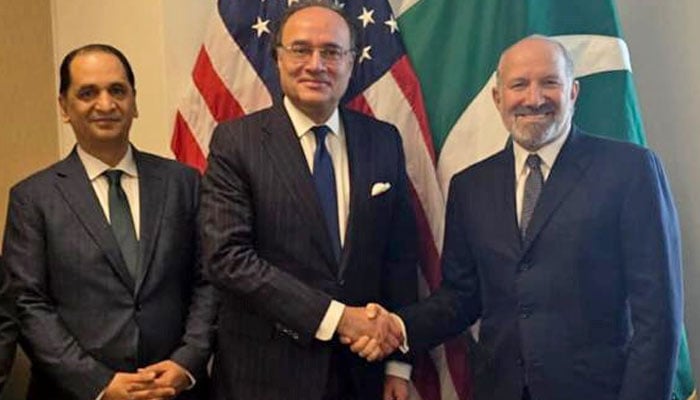Pakistan, US clinch landmark trade deal on tariffs, oil reserves
"Who knows, maybe they [Pakistan] will be selling oil to India some day!", says Trump, confirming joint oil ventures
July 31, 2025

- Trump says US oil company to soon be selected to lead partnership.
- India faces 25% US tariffs, possible penalties over Russian imports.
- Pressure mounting on Modi govt as trade talks with US inconclusive.
In yet another major diplomatic win for Pakistan, US President Donald Trump has confirmed the finalisation of a trade agreement between the two countries, a move that signals growing trust and deepening economic ties between Islamabad and Washington.
The announcement comes as India, still scrambling to finalise a trade deal with Washington, finds itself under growing pressure, staring down hefty 25% tariffs and the risk of penalties over its continued energy ties with Russia.
"We have just concluded a Deal with the Country of Pakistan, whereby Pakistan and the United States will work together on developing their massive Oil Reserves," Trump wrote on social media.
"We are in the process of choosing the Oil Company that will lead this Partnership."
According to the Ministry of Finance, the breakthrough came during Finance Minister Muhammad Aurangzeb's meeting with the US Secretary of Commerce and Trade Representative. Pakistan’s Ambassador to the US, Rizwan Saeed Sheikh, and Commerce Secretary Jawad Paul were also present.
"The purpose of the deal is to boost bilateral trade, improve market access, attract investment, and strengthen cooperation in areas of mutual interest," the official statement said.
"Under the agreement, there will be a reduction in tariffs, particularly on Pakistani exports to the US, and a fresh start in economic cooperation between the two countries.
"The two sides will focus on energy, minerals, information technology, cryptocurrency, and other key areas, the statement added.
It added that the agreement would help grow Pakistan’s trade ties with the US and improve access to each other’s markets. "It is also expected to draw more US investment into Pakistan’s infrastructure and development projects."
Aurangzeb says broader partnership taking shape
Finance Minister Senator Muhammad Aurangzeb told Geo News that Pakistan and the United States had agreed to move trade and investment hand in hand, following a key meeting in Washington.
Speaking after talks with US Commerce Secretary Howard Lutting and Trade Representative Jameson Greer, Aurangzeb described the meeting as constructive and said the two sides finalised the trade agreement during the discussion.
“This deal reflects a broader economic and strategic partnership that’s now taking shape,” he said.
The minister thanked all those involved in the negotiations, saying the private sector had played a vital role and would continue to be supported, especially in helping to reduce the trade imbalance.
US total goods trade with Pakistan was an estimated $7.3 billion in 2024, according to the website of the Office of the US Trade Representative, up from around $6.9 billion in 2023. The US goods trade deficit with Pakistan was $3 billion in 2024, a 5.2% increase over 2023.
Dar says it's a done deal
Meanwhile, DPM Dar broke the news in a late-night post on X, declaring: "Pakistan concludes deal with USA, AlhamdoLilah." His announcement capped off what officials are calling a breakthrough moment in Pakistan’s economic diplomacy.
Last week, Deputy Prime Minister and Foreign Minister Ishaq Dar said the United States and Pakistan were "very close" to a trade deal that could come within days, after he met with Secretary of State Marco Rubio on Friday.
The US State Department and Pakistan's foreign ministry, in separate statements after Rubio meets with Dar, said last week the two top diplomats stressed in their discussion the importance of expanding trade and ties in critical minerals and mining.
"Our teams have been here in Washington discussing, having virtual meetings, and a committee has been tasked by the prime minister to fine-tune now," Dar said last week about US-Pakistan talks.
Trump also said Washington was still negotiating with Pakistan's rival India on trade after announcing earlier in the day that the US would impose a 25% tariff on goods imported from India starting on Friday.
Pakistan has also recently said it "appreciated the pivotal role" of Trump and Rubio in de-escalating tensions between Pakistan and India by facilitating a ceasefire."
Trump has repeatedly taken credit for the India-Pakistan ceasefire he announced on social media on May 10 after Washington held talks with both sides. India disputes Trump's claims that the ceasefire resulted from his intervention and trade threats.
India's position is that New Delhi and Islamabad must resolve problems directly with no outside involvement.
The latest escalation in the decades-old rivalry was triggered by a deadly April 22 militant attack in Indian Illegally Occupied Jammu and Kashmir (IIOJK) that India blamed on Pakistan. Islamabad denied responsibility. India struck Pakistan on May 7, and the two nations fought until the ceasefire was declared on May 10.
India slapped with 25% tariff
Trump said on Wednesday the United States is still negotiating with India on trade after announcing earlier in the day the US will impose a 25% tariff on goods imported from the country starting on Friday.
The 25% tariff, as well as an unspecified penalty announced by Trump in a morning social media post, would strain relations with the world's most populous democracy.
Later at the White House, the Republican president indicated there was wiggle room.
"They have one of the highest tariffs in the world now, they're willing to cut it very substantially," Trump told reporters. "We're talking to India now - we'll see what happens ... You'll know by the end of this week."
The 25% figure would single out India more severely than other major trading partners, and threaten to unravel months of talks between the two countries, undermining a strategic partner of Washington’s and a counterbalance to China.
What the penalty would be was not clear. Trump initially indicated it was for India buying Russian arms and oil, and its non-monetary trade barriers.
When asked about the penalty at the White House, he said it was partly due to trade issues and partly because of India's involvement in the BRICS group of developing nations, which he described as hostile to the US.
Trump, in July, said the US will impose an additional 10% tariff on any country aligning itself with the "Anti-American policies" of the BRICS.
The India announcement came as countries face a Friday deadline to reach deals on reciprocal tariffs or have a Trump-imposed tariff slapped on them. Trump on Wednesday signed a proclamation ordering 50% tariffs on certain copper imports, citing national security, the White House said.
The new US tax on imports from India would be higher than on many other countries that struck deals with the Trump administration recently. Vietnam's tariff is set at 20% and Indonesia's at 19%, while the levy for Japan and the European Union is 15%.
"This is a major setback for Indian exporters, especially in sectors like textiles, footwear, and furniture, as the 25% tariff will render them uncompetitive against rivals from Vietnam and China," said SC Ralhan, president of the Federation of Indian Export Organisation.












